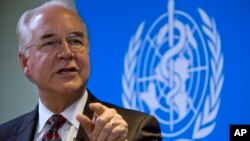China has been an "incredible partner" in cracking down on synthetic opioids seen as fueling fast-rising overdose deaths in the United States, U.S. Health and Human Services Secretary Tom Price said Monday during a visit to the country considered the source of many of the deadly substances sought by addicts.
Price said China has been quick to respond when regulators identify a threat from a dangerous drug such as fentanyl, the powerful opioid blamed for thousands of fatal overdoses, including the death of entertainer Prince.
"When a particular drug is identified as being a problem, China has been an incredible partner in helping to stop the production of drugs like fentanyl in China," Price told The Associated Press.
A bigger challenge comes from the "rapidly changing ability of individuals to formulate new chemical makeups that are a different drug and that aren't in the controlled arena," Price said. "The challenge is to get those taken care of much more rapidly. And so that's the conversations that we need to be having."
Last month, China banned a designer drug called U-47700 and three others following U.S. pressure to do more to control synthetic opioids.
In China, U-47700 had been a legal alternative to fentanyl and potent derivatives like carfentanil. Its usage has been growing among U.S. opioid addicts.
The U.S. Drug Enforcement Agency has long said that China is the top source country for synthetic opioids like fentanyl and its precursors, assertions Beijing has said lack firm evidence. Still, the two countries have deepened cooperation as the U.S. opioid epidemic intensifies.
Price also expressed support for continued funding of the World Health Organization amid questions about President Donald Trump's commitment to the United Nations. The U.S. is currently the largest contributor to the WHO's budget.
Those in Congress responsible for drawing up budget plans "appreciate the importance of WHO, appreciate the incredible importance of the United States' support of WHO, not just rhetorically, but financially as well," Price said.




